These camps take those fleeing ‘that hell’ of Mosul. First, prove you’re not Islamic State
- Share via
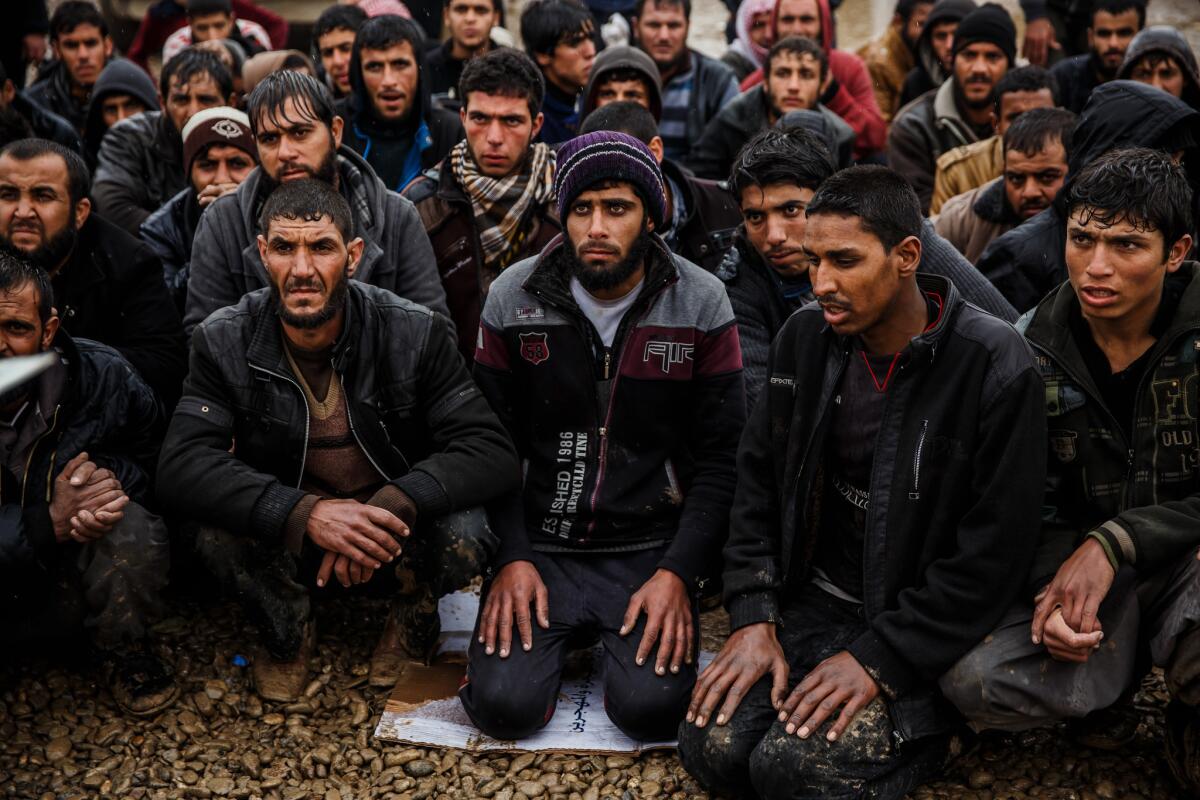
“We think he may be Islamic State,” the Iraqi police officer said.
The officer was seated behind the window of a trailer outside a United Nations displaced persons camp 20 miles south of Mosul. A laptop computer in front of him displayed a spreadsheet containing names of more than 40,000 Islamic State suspects.
Among them was the name of the bearded man standing before him, Ahmed Hussein Hasan. It is fairly common in Iraq.
Hasan, 32, had just fled from west Mosul with his family and neighbors. Before they could enter the camp, the men had to clear police screening — were they legitimate refugees, or insurgents hiding among fleeing civilians?
Six months into the Mosul offensive, thousands of civilians are still fleeing the city, with a recent surge of up to 15,000 a day passing through Hamam Alil. That has raised the stakes of security screenings, which need to proceed quickly to avoid a bottleneck but also sensitively to prevent displaced Sunni Muslims from becoming alienated from the central government, dominated by rival Shiites.
“Our task here is to show people we came to help and take them out of that hell,” Gen. Basem Khaled said as he supervised screening last week. “We act according to the rules like anyone else. We’ve been told human rights are the most important.”
The police officer outside the United Nations camp scrutinized Hasan’s laminated government identification card, issued before Islamic State captured Mosul in 2014. On it, he appeared cleanshaven.
“What are your brothers’ names?” the officer demanded.
Hasan told him the names. Then he smiled and shrugged ruefully in his brown canvas jacket, insisting he was not a militant. He seemed caught in a bind, one, he insisted, that was the doing of Islamic State.
“They told me to have a beard,” he said. “Now I come here and they” — the police — “say I’m Daesh,” the Arabic acronym for Islamic State. “I don’t know what to do.”
Police checked his father’s name against that of the suspect’s father, then his grandfather’s name. They didn’t match. They handed Hasan his ID card back. He was free to go.
But that’s not always the case. Dozens of suspected Islamic State militants have been detained over the last two weeks as officers examine those flooding into the camps.
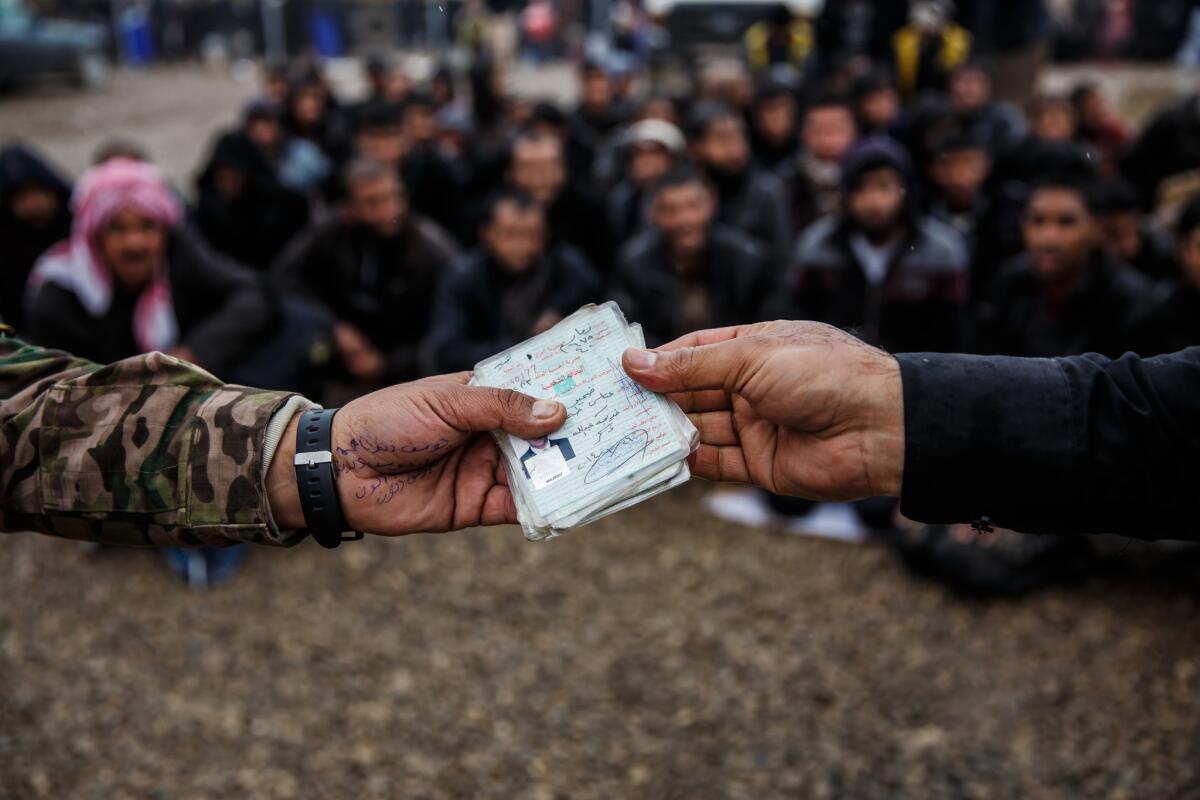
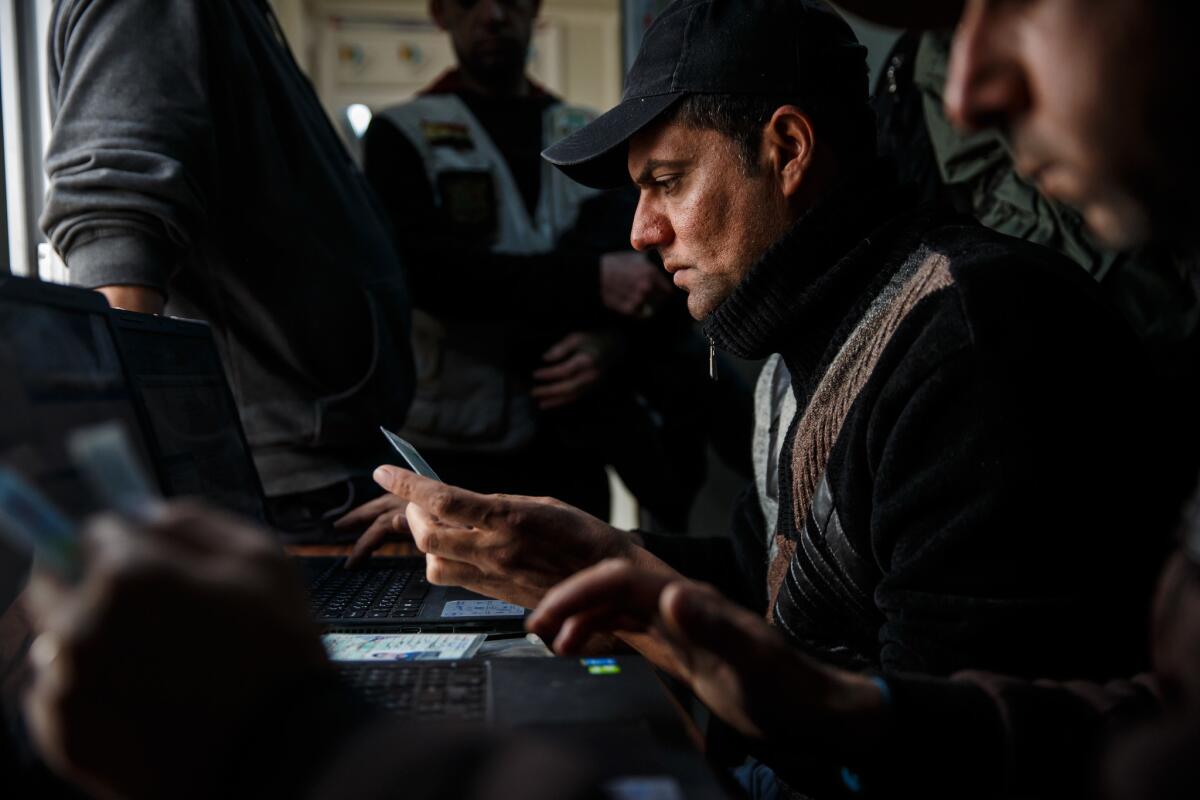
The government faced criticism after past offensives against Islamic State for allowing Shiite militias to screen Sunni men, some of whom were later tortured and disappeared, according to reports by Human Rights Watch and Amnesty International.
The militias, now government-sanctioned and responsible to the prime minister, were enlisted to participate in the Mosul offensive. A spokesman said they had learned from past mistakes and were fighting professionally on the outskirts of the mostly Sunni city.
But Belkis Wille, a senior Iraq researcher at Human Rights Watch, said the militias, known as Popular Mobilization Forces, or PMF, should not be involved in screenings.
“We are concerned about how this process works and what happens to those detained,” she said. “The concern is even greater in remote areas that we do not have access to, particularly those areas where only the PMF are present.”
No militia members appeared to be at the Hamam Alil camp screening area on a recent day. Instead, community police from Baghdad assisted federal police and national security service officers with screenings.
“We’re here to try to change the mind of the people about the police,” officer Saad Mahmoud said. “We try to get people to understand we are here to help them.”
They stopped 50 suspected militants in the last 10 days, based mostly on the government list of suspicious names compiled from official records, Iraqi forces and local informants.
They get tips from confidential informants at the camp, some of whom come to the trailers, scarves hiding their faces, scan the crowd and point out militants to police.
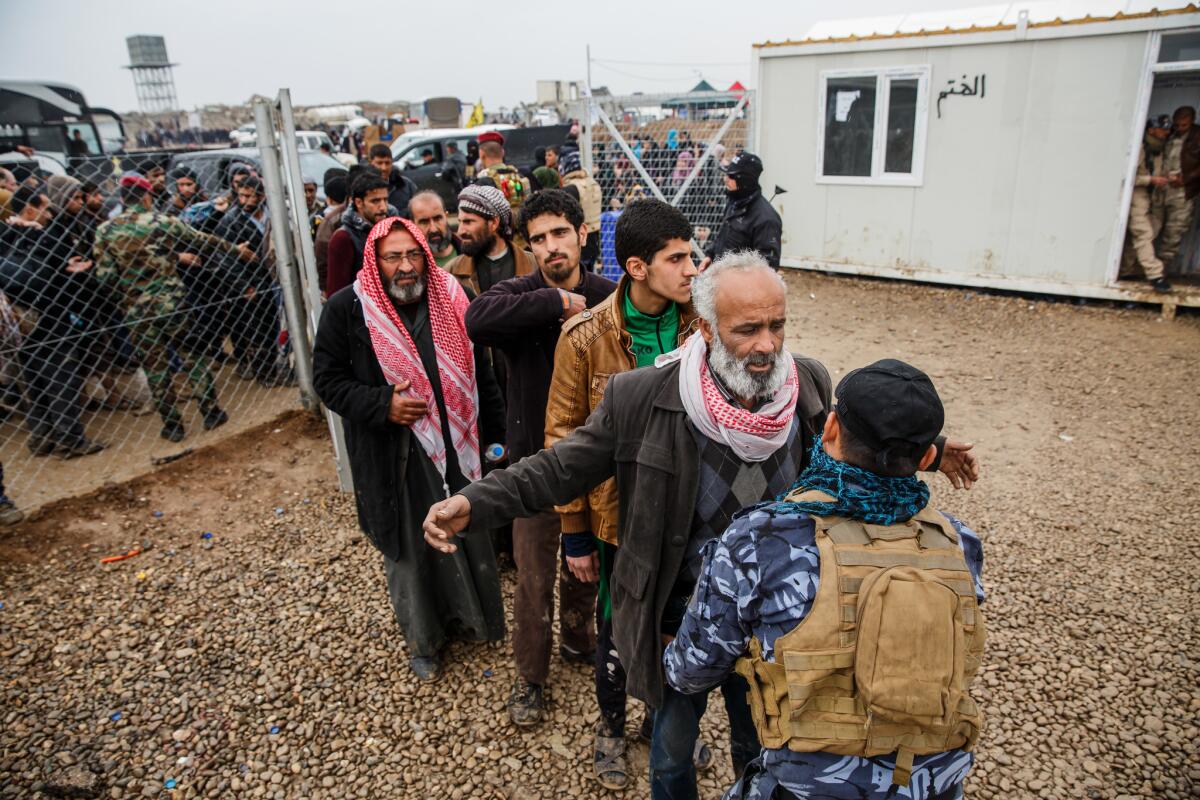
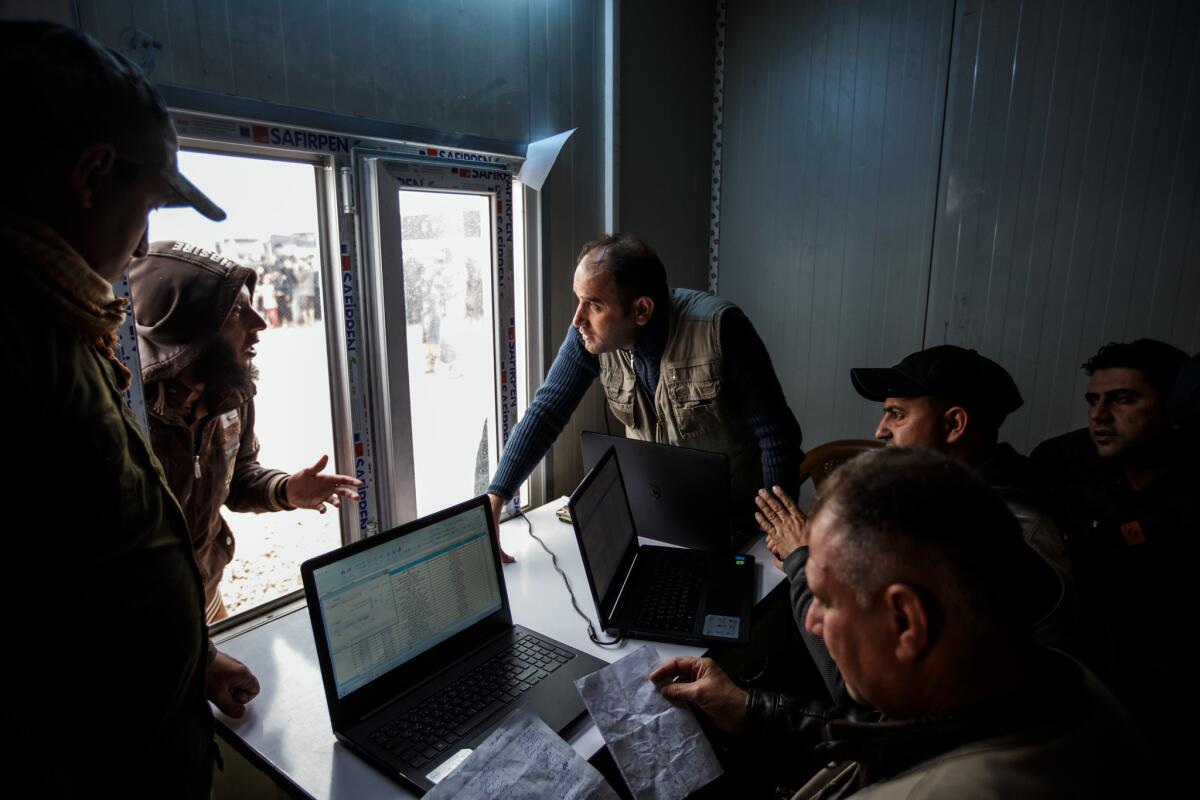
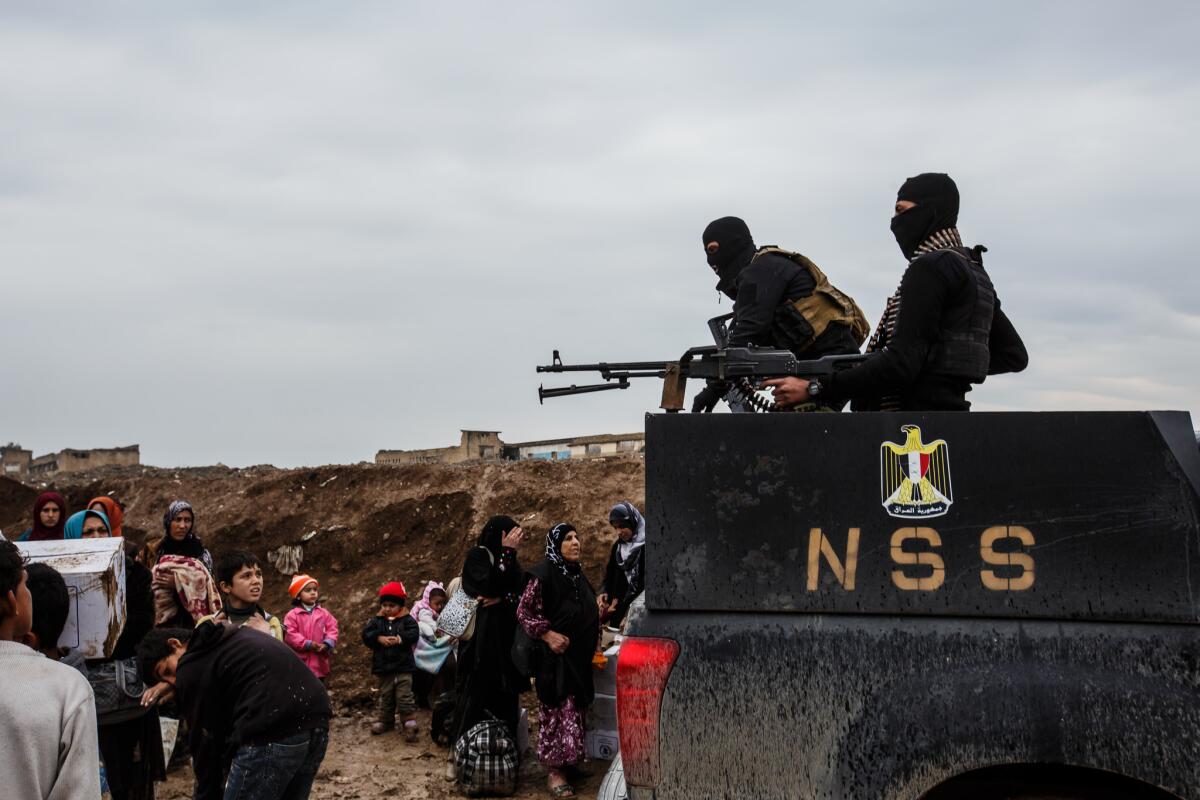
Relying on such informants can be dangerous, police acknowledged: In at least one case, an informant fingered men he had grudges against.
“He was hating some people so he was telling us about them,” said community police officer Ali Nor Rahman, adding that officers were not fooled.
But police said they have found reliable informants who help them root out militants.
A man approached the trailers in dress slacks and leather shoes with a black-and-white scarf wrapped around his face.
“This guy has been very helpful,” Rahman said. “We listen to what he says, but we check it.”
Iraqi forces brought a group of 70 men to the fenced screening area, some barefoot and shivering. After the men’s identification cards were collected, police pulled a thin, bearded 27-year-old man aside. They led him by the collar of his black quilted jacket into an empty trailer.
“I’m not Daesh. This is wrong. I didn’t do anything. Check everything,” the man protested quietly as he stood in a corner of the trailer.
“We’re not saying you’re Daesh, but your name is on the list,” a police officer said.
“I swear to God I didn’t do anything,” the man insisted.
Police asked the informant to come into the trailer; he agreed only when they allowed him to keep his face covered. It wasn’t clear whether he identified the suspect, but police kept the man in the trailer and said he was being held as a suspected militant.
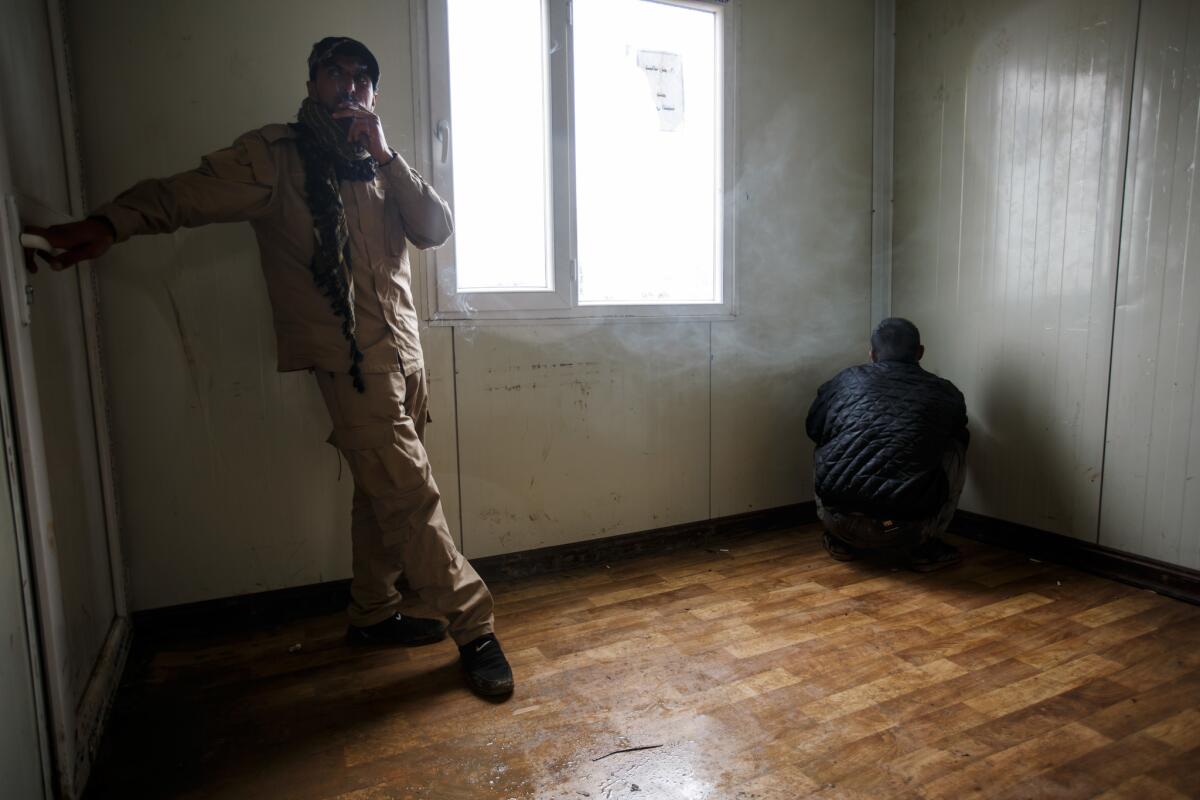
After detaining suspects, police say they turn them over to security forces. In some areas outside Mosul, suspects are held by military intelligence in abandoned houses as they await hearings before Iraqi judges. If convicted, they face stiff penalties: from 15 years for assisting militants up to a death sentence for violent crimes.
A 20-year-old in an orange Texas Longhorns sweatshirt arrived at the screening area with his tearful mother, who complained that her son, Saif Ali Ahmed, provided police with his ID card and they never returned it.
Police were skeptical.
“Most of the time Islamic State is taking their ID, so they come here and say they lost it,” community police officer Saad Mahmoud said of militant fighters.
Police didn’t find Ahmed on their list. Still, they said he needed to get a new identification card before he could enter the camp. He said he didn’t know how. He and his mother stood waiting for help. None came.
Ashraf Mohammed Nouri, 21, arrived cradling his 11-month-old daughter, Manara, having survived an attack by militants that killed his wife and other relatives.
He said militants had warned civilians not to trust Iraqi security forces.
“They told us the police and army would cut our heads off because they’re Shiite and we’re Sunni,” he said. “Now I see it’s not true.”
The police are, as Nouri said, largely Shiite, although they insist that the screening process is nonsectarian.
Some of the mostly Sunni men arrived having not eaten for days, and when one young man collapsed, police brought him inside, gave him water and a hot plate of chicken until he revived (his name was not on the list). His family said they appreciated the army rescuing them from Islamic State and treating them with respect during screening.
Outside, Abdul Ghani Taha Ahmed, 65, sat with a cane propped against his rain-soaked Lakers duffel bag as family awaited him outside the camp. He said police had treated him well, but he was still hungry and tired of waiting in the mud. Even when done quickly, and with respect, the screening process is debilitating.
“It’s like purgatory,” he said, before police cleared and allowed him to pass through the gate toward the scrum of waiting buses packed with other displaced families.
Lead photo: Men wait silently for their names to be called by members of Community Policing, a part of the Iraqi government, screening incoming civilians in case Islamic State members are hiding among them at the displaced persons camp in Hammam Alil. (Marcus Yam / Los Angeles Times)
Twitter: @mollyhf
ALSO
Iraqi military denies that an airstrike caused massive civilian casualties in Mosul
American medics try to heal Mosul
One big reason that Syria's future looks bleak: Education has been a victim of war
Sign up for Essential California
The most important California stories and recommendations in your inbox every morning.
You may occasionally receive promotional content from the Los Angeles Times.








